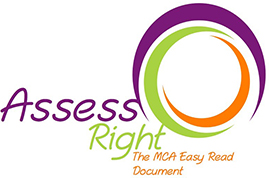Capacity assessments
A person is assumed to be able to make their own decisions unless it has been established otherwise.
In order to decide whether an individual has the capacity to make a particular decision you must answer two questions:
- Is there an impairment of, or disturbance in the functioning of a person's mind or brain?
- If so, is the impairment or disturbance mean that the person is unable to make a specific?
The following should be considered when deciding if a person is unable to make a decision if they cannot do one or more of the following four things:
- Does the person understand the information given to them and relevant to the decision to be made?
- Can the person retain the information in their mind long enough to be able to make the decision?
- Can the person weigh up that information as part of their decision making?
- Can the person communicate their decision (whether by talking, using sign language or any other means for example, simple muscle movements such as blinking an eye or squeezing a hand).
When deciding if a person is able to make a decision all practicable steps need to be taken to help the person make a decision this includes the following:
- Has all relevant information been provided to the person?
- Have the all relevant persons been consulted?
- Has information been communicated in an appropriate form to the person?
- Has help been sought to assist with this communication?
- Has there been any treatment of a medical condition which may have an effect on capacity?
- Has consideration been given to delaying the decision?
Every effort should be made to find ways of communicating with someone before deciding that they lack capacity to make a decision based solely on their inability to communicate. Then you will need to involve family, friends, carers or other professionals.
The Mental Capacity Act is designed to empower those in health and social care to do capacity assessments once they have been trained to do so, rather than relying on expert testing by doctors.
However, in cases involving complex or major decisions you may need to get a professional opinion. This could be a general practitioner (GP) or a specialist doctor.
The assessment is made on the balance of probabilities – is it more likely than not that the person lacks capacity? You should be able to show in your records why you have come to your conclusion that capacity is lacking for the particular decision.
Learn more
Find out more on mental capacity testing at NHS Choices.
Assess Right is an excellent easy-read guide to mental capacity assessments jointly published by NHS Aylesbury Vale CCG and NHS Chiltern CCG.



